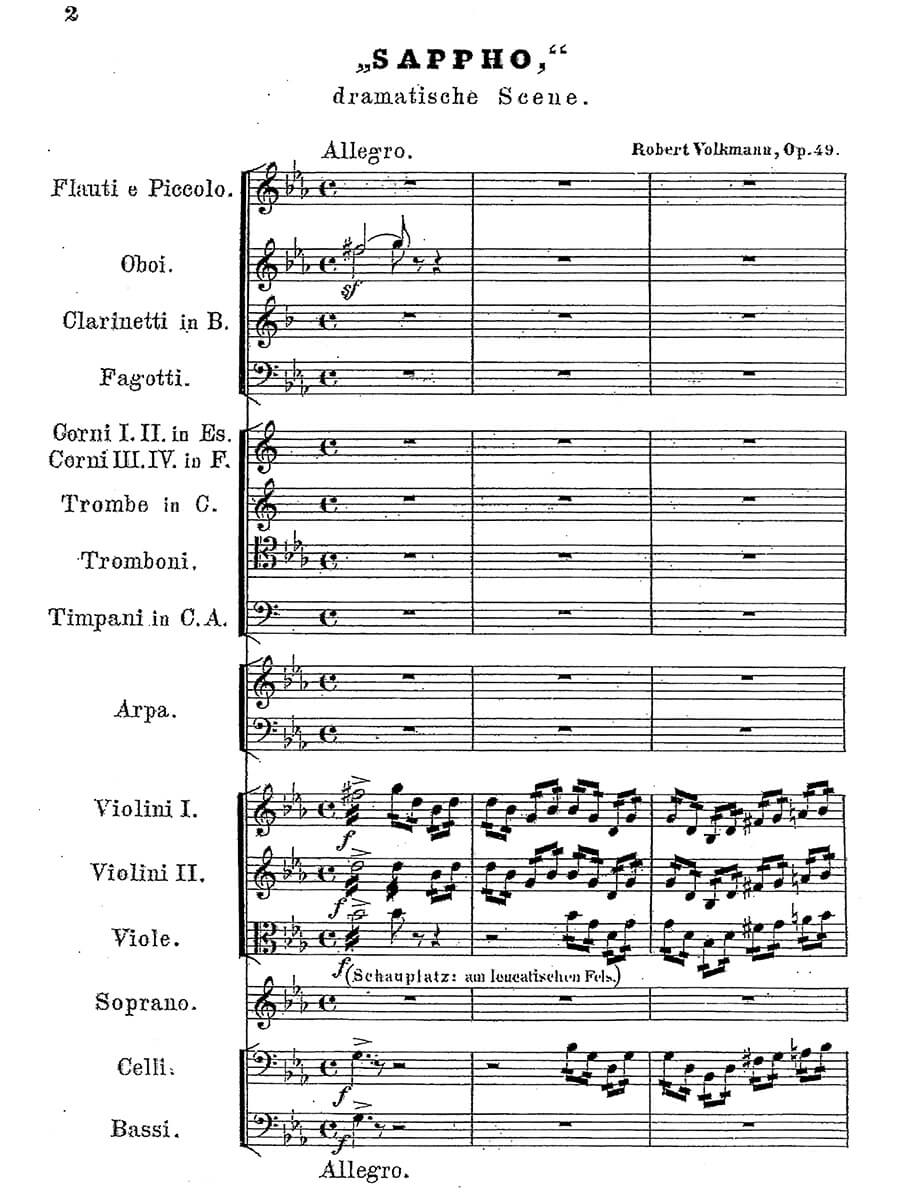Sappho Op. 49, Dramatic Scene for Solo Soprano with Orchestra
Volkmann, Robert
23,00 €
Preface
Volkmann, Robert – Sappho Op. 49, Dramatic Scene for Solo Soprano with Orchestra
(b. Lommatzsch near Meißen, 6 April 1815 — d. Budapest, 29 October 1883)
Dramatic Scene for Solo Soprano with Orchestra (1865)
Preface
Among the forgotten German romantic composers associated with Mendelssohn, Schumann, Liszt, and the slightly younger Brahms, Robert Volkmann was one of the most original and significant. The second son of a Lutheran cantor, Gotthelf Volkmann (1767-1833), he began to compose while still in his childhood and played the piano, organ, violin, and cello. In 1832 he went to study in Freiberg, where he was championed by the town music director, an ardent Beethovenian named August Ferdinand Anacker (1790-1851). Anacker encouraged Volkmann to pursue a musical career, and the young man duly moved to Leipzig in 1836. At that time Leipzig did not have a conservatory (it would not be founded until 1843), and Volkmann studied composition and theory with Karl Ferdinand Becker (1804-1877), the organist of St. Peter’s and later the head of the organ department at the Conservatory. He also attended the ‘Thursday concerts’, conducted by Felix Mendelssohn in the Gewandhaus, and enjoyed the esteem of Robert Schumann. In October 1839 he accepted a teaching appointment at a music school in Prague, but a year later he was retained as a music teacher for the two daughters of Countess Stainlein-Saalenstein at their family estate in Szemeréd near Ipolyság, Hungary. Here he increasingly turned to composition. As part of the countess’s retinue he often visited Pest, the then largely German section of present-day Budapest. After resigning his position in Szemeréd in June 1841 he moved to Pest, where his first works of any importance originated. In 1844 a breach arose between the confirmed bachelor and his family in Saxony, a breach so bitter that when his mother died in 1852 she did not know whether her son were still alive. In 1846 he composed a string quartet in G minor, later to become his Second Quartet, op. 14; it was followed a year later by what would become his First String Quartet in A minor, op. 9.
In autumn 1850 Volkmann completed what was to be his most successful work during his lifetime: the smoldering and impassioned Piano Trio in B minor, op. 5, published by Rózsavölgyi in 1852. He dedicated the work to Liszt, who played it together with Joseph Joachim (1831-1907) and Bernhard Cossmann (1822-1910). In 1853, he formed an acquaintance in Pest with Hans von Bülow (1830-1894). The acquaintance developed into a friendship, and Bülow became a staunch advocate of the B-minor Trio, which he played for the first time in Berlin on 3 December 1853. Soon the composer was the talk of the town; even Wagner, Felix Draeseke (1835-1913), and Alexander Ritter (1833-1896) waxed ecstatic at the B-minor Trio. Volkmann’s brother learned via the press that the composer was not only alive, but had at long last made a success of himself. Volkmann now paid a visit to his home. From 1854 to 1858 he lived in Vienna, where he formed a friendship with Johannes Brahms and wrote a great deal of piano music. A deep-seated friendship ensued with the publisher and idealistic patron Gustav Heckenast in the Hungarian town of Maróth. Among the works that Volkmann wrote in Vienna are the Variations on a Theme by Handel, op. 26 (his most successful piano piece), the string quartets in G major (op. 34) and E minor (op. 35), and the completion of his famous single-movement Cello Concerto in A minor, op. 33, which was given its première in Vienna on 22 November 1857 by Karl Schlesinger (1813-1871). The latter work belonged to the standard cello repertoire until well into the twentieth century and has recently again received occasional hearings. …
Read full preface / Das ganze Vorwort lesen > HERE
Score Data
| Edition | Repertoire Explorer |
|---|---|
| Genre | Chor/Stimme & Orchestra |
| Seiten | 70 |
| Format | 210 x 297 mm |
| Druck | Reprint |
